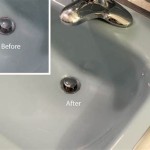Are Granite Composite Sinks Good? A Comprehensive Evaluation
Granite composite sinks have become increasingly popular in modern kitchens. Their blend of durability, aesthetics, and affordability positions them as a compelling alternative to traditional stainless steel or porcelain sinks. Determining whether they are a "good" choice hinges on a nuanced understanding of their composition, characteristics, advantages, disadvantages, and suitability for specific needs and lifestyles. This article will delve into these aspects to provide a comprehensive evaluation.
A granite composite sink is manufactured from a mixture of granite stone dust and acrylic resins. The typical composition is approximately 80% granite dust and 20% acrylic resin. This combination aims to leverage the natural strength and heat resistance of granite while using the resin as a binding agent to create a moldable and durable material. The specific grade and quality of both the granite and the resin significantly impact the final product's performance and longevity. Lower-quality materials can result in a sink that is more prone to staining, chipping, or discoloration.
The manufacturing process involves combining the granite dust and resin under high pressure and temperature. This process ensures uniform distribution of the materials and creates a dense, non-porous structure. The sink is then molded into the desired shape and cured to harden the resin. Some manufacturers may add pigments during the mixing process to achieve a wide range of colors and finishes. The final product is a sink that emulates the look of natural stone while offering enhanced durability and ease of maintenance compared to pure granite sinks.
Durability and Resistance
One of the primary reasons granite composite sinks are considered a good option is their exceptional durability. The high granite content contributes to their resistance to scratches, chips, and stains compared to stainless steel or porcelain sinks. They are capable of withstanding the rigors of daily use, even in high-traffic kitchens. While not entirely impervious to damage, they are significantly more resilient than many other sink materials. Impact resistance is also a key advantage; they are less likely to dent or crack from falling pots and pans compared to thinner gauge stainless steel sinks.
Heat resistance is another significant benefit. Granite composite sinks can typically withstand temperatures up to 535 degrees Fahrenheit (280 degrees Celsius) without warping or discoloring. This allows for the safe disposal of boiling water or hot cookware without fear of damaging the sink. However, it's still recommended to exercise caution and avoid sudden temperature changes, as extreme thermal shock can potentially cause damage.
Stain resistance is a crucial factor for maintaining the aesthetic appeal of any kitchen sink. Granite composite sinks, particularly those with a high granite content and a quality resin binder, are generally resistant to common household stains from coffee, tea, wine, and food. However, certain highly pigmented substances, such as turmeric or beet juice, may cause staining if left on the surface for extended periods. Regular cleaning and prompt removal of spills are essential for preventing permanent stains.
Aesthetics and Design Versatility
Granite composite sinks offer a wide range of aesthetic options, making them a versatile choice for various kitchen design styles. They are available in a multitude of colors, from neutral tones like black, gray, and beige to more vibrant hues. This allows homeowners to coordinate the sink with their countertops, cabinetry, and other kitchen elements. The matte finish also contributes to a sophisticated and modern look.
The molding process allows for the creation of different sink shapes and configurations. Single-bowl, double-bowl, and even triple-bowl designs are available, catering to different needs and preferences. Undermount, drop-in, and farmhouse-style installations are all possible, further enhancing the design flexibility. The clean lines and seamless integration of undermount sinks, in particular, contribute to a sleek and contemporary aesthetic.
The textured surface of granite composite sinks can also add visual interest to the kitchen. While the surface is generally smooth to the touch, it often exhibits a subtle texture that mimics the look of natural stone. This texture can help to conceal minor scratches and blemishes, further contributing to the sink's longevity. The color is typically consistent throughout the material, which means that scratches, if they occur, are less noticeable than on sinks with a surface coating.
Maintenance and Cleaning
Maintaining a granite composite sink is generally straightforward. Regular cleaning with mild soap and water is usually sufficient to keep the sink looking its best. A soft cloth or sponge is recommended to avoid scratching the surface. For stubborn stains or buildup, a non-abrasive cleaner can be used. Avoid using harsh chemicals, abrasive scrubbers, or steel wool, as these can damage the sink's surface.
Preventative maintenance is crucial for extending the lifespan of a granite composite sink. Wiping the sink dry after each use can help to prevent water spots and mineral buildup. Periodically applying a granite sealant can also help to protect the sink from stains and scratches. It is also advisable to use a sink grid or basin protector to prevent direct contact with sharp objects or heavy cookware.
Minor scratches can often be buffed out with a specialized granite composite sink cleaner or scratch remover. For more significant damage, professional repair services may be required. However, with proper care and maintenance, granite composite sinks can maintain their appearance and functionality for many years. The ease of cleaning, compared to materials like stainless steel which can show water spots and fingerprints more readily, is a significant advantage for many homeowners.
Despite their advantages, granite composite sinks are not without potential drawbacks. One common concern is their cost, which can be higher than that of basic stainless steel or acrylic sinks. However, the increased durability and aesthetic appeal often justify the higher price point for many buyers. The weight of granite composite sinks can also be a factor, requiring adequate support during installation.
Another potential issue is the risk of staining, particularly with lighter-colored sinks. While generally stain-resistant, granite composite sinks can be susceptible to staining from highly pigmented substances if spills are not promptly cleaned. Proper maintenance and the use of a sealant can help to mitigate this risk. Some users have also reported that the surface can become dull over time, although this can often be addressed with a specialized granite composite sink cleaner.
The quality of the materials used in the manufacturing process can also impact the sink's performance. Lower-quality granite composite sinks may be more prone to chipping, cracking, or discoloration. It is essential to choose a reputable brand and to carefully inspect the sink before installation to ensure that it is free from defects. Reading reviews and researching the manufacturer can provide valuable insights into the sink's overall quality and durability.
Comparing Granite Composite to Other Sink Materials
To fully appreciate the merits of granite composite sinks, it is helpful to compare them to other popular sink materials, such as stainless steel, porcelain, and natural granite. Stainless steel sinks are known for their durability and affordability, but they can be prone to scratching and denting. They are also often criticized for their noisy operation. Porcelain sinks offer a classic look, but they can be easily chipped or stained. Natural granite sinks are beautiful and durable, but they are very expensive and require specialized installation.
Granite composite sinks offer a compelling blend of the advantages of these other materials. They are more durable and stain-resistant than stainless steel or porcelain sinks while being more affordable and easier to maintain than natural granite sinks. They also offer a wider range of design options than stainless steel sinks. While they may not be as inexpensive as basic stainless steel sinks, the added durability and aesthetic appeal often make them a worthwhile investment.
Ultimately, the choice of sink material depends on individual preferences, budget, and lifestyle. However, granite composite sinks offer a compelling combination of durability, aesthetics, and affordability that makes them a worthy consideration for any kitchen renovation or new construction project.
What Is Granite Composite Signature Hardware

Granite Sinks Vs Stainless Steel

Pros And Cons Of Granite Quartz Sinks Selection

Kitchen Sinks Granite Composite Offers Superior Durability

Everything You Need To Know Before Ing A Granite Composite Sink
What Is Granite Composite Signature Hardware

Allen Roth Granite Composite Dual Mount 33 In X 22 Black Metallic Quartz Single Bowl 5 Hole Kitchen Sink Jj Large Sb Gnt Comp At Com

Composite Kitchen Sinks The Pros And Cons Cookology

Kraus Kgd 410b 24 2 5 Inch Dual Mount Single Bowl Black Onyx Granite Kitchen Sink
Top 5 Reasons To Install A Granite Kitchen Sink Carved Stone Creations







